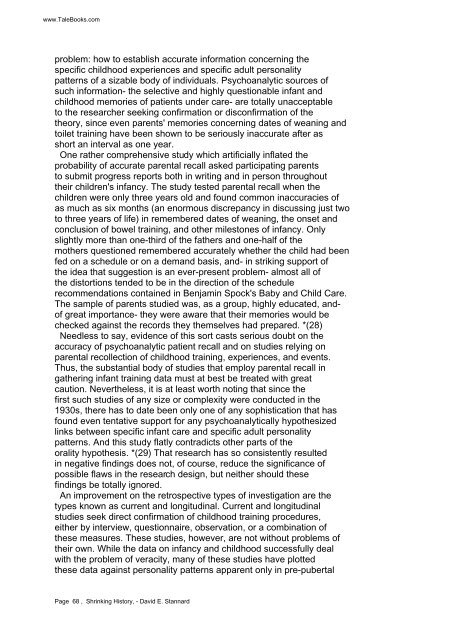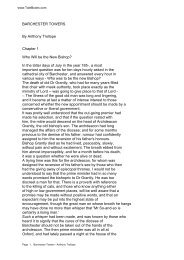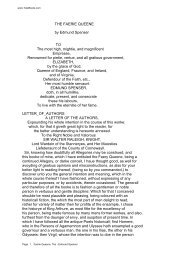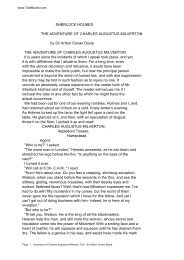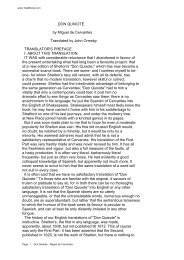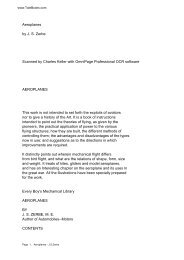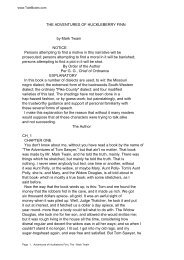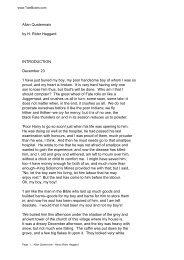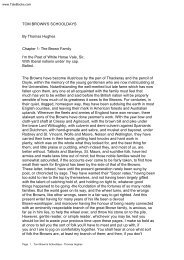SHRINKING HISTORY, On Freud and the Failure of ... - Planet.ee
SHRINKING HISTORY, On Freud and the Failure of ... - Planet.ee
SHRINKING HISTORY, On Freud and the Failure of ... - Planet.ee
Create successful ePaper yourself
Turn your PDF publications into a flip-book with our unique Google optimized e-Paper software.
www.TaleBooks.com<br />
problem: how to establish accurate information concerning <strong>the</strong><br />
specific childhood experiences <strong>and</strong> specific adult personality<br />
patterns <strong>of</strong> a sizable body <strong>of</strong> individuals. Psychoanalytic sources <strong>of</strong><br />
such information- <strong>the</strong> selective <strong>and</strong> highly questionable infant <strong>and</strong><br />
childhood memories <strong>of</strong> patients under care- are totally unacceptable<br />
to <strong>the</strong> researcher s<strong>ee</strong>king confirmation or disconfirmation <strong>of</strong> <strong>the</strong><br />
<strong>the</strong>ory, since even parents' memories concerning dates <strong>of</strong> weaning <strong>and</strong><br />
toilet training have b<strong>ee</strong>n shown to be seriously inaccurate after as<br />
short an interval as one year.<br />
<strong>On</strong>e ra<strong>the</strong>r comprehensive study which artificially inflated <strong>the</strong><br />
probability <strong>of</strong> accurate parental recall asked participating parents<br />
to submit progress reports both in writing <strong>and</strong> in person throughout<br />
<strong>the</strong>ir children's infancy. The study tested parental recall when <strong>the</strong><br />
children were only thr<strong>ee</strong> years old <strong>and</strong> found common inaccuracies <strong>of</strong><br />
as much as six months (an enormous discrepancy in discussing just two<br />
to thr<strong>ee</strong> years <strong>of</strong> life) in remembered dates <strong>of</strong> weaning, <strong>the</strong> onset <strong>and</strong><br />
conclusion <strong>of</strong> bowel training, <strong>and</strong> o<strong>the</strong>r milestones <strong>of</strong> infancy. <strong>On</strong>ly<br />
slightly more than one-third <strong>of</strong> <strong>the</strong> fa<strong>the</strong>rs <strong>and</strong> one-half <strong>of</strong> <strong>the</strong><br />
mo<strong>the</strong>rs questioned remembered accurately whe<strong>the</strong>r <strong>the</strong> child had b<strong>ee</strong>n<br />
fed on a schedule or on a dem<strong>and</strong> basis, <strong>and</strong>- in striking support <strong>of</strong><br />
<strong>the</strong> idea that suggestion is an ever-present problem- almost all <strong>of</strong><br />
<strong>the</strong> distortions tended to be in <strong>the</strong> direction <strong>of</strong> <strong>the</strong> schedule<br />
recommendations contained in Benjamin Spock's Baby <strong>and</strong> Child Care.<br />
The sample <strong>of</strong> parents studied was, as a group, highly educated, <strong>and</strong><strong>of</strong><br />
great importance- <strong>the</strong>y were aware that <strong>the</strong>ir memories would be<br />
checked against <strong>the</strong> records <strong>the</strong>y <strong>the</strong>mselves had prepared. *(28)<br />
N<strong>ee</strong>dless to say, evidence <strong>of</strong> this sort casts serious doubt on <strong>the</strong><br />
accuracy <strong>of</strong> psychoanalytic patient recall <strong>and</strong> on studies relying on<br />
parental recollection <strong>of</strong> childhood training, experiences, <strong>and</strong> events.<br />
Thus, <strong>the</strong> substantial body <strong>of</strong> studies that employ parental recall in<br />
ga<strong>the</strong>ring infant training data must at best be treated with great<br />
caution. Never<strong>the</strong>less, it is at least worth noting that since <strong>the</strong><br />
first such studies <strong>of</strong> any size or complexity were conducted in <strong>the</strong><br />
1930s, <strong>the</strong>re has to date b<strong>ee</strong>n only one <strong>of</strong> any sophistication that has<br />
found even tentative support for any psychoanalytically hypo<strong>the</strong>sized<br />
links betw<strong>ee</strong>n specific infant care <strong>and</strong> specific adult personality<br />
patterns. And this study flatly contradicts o<strong>the</strong>r parts <strong>of</strong> <strong>the</strong><br />
orality hypo<strong>the</strong>sis. *(29) That research has so consistently resulted<br />
in negative findings does not, <strong>of</strong> course, reduce <strong>the</strong> significance <strong>of</strong><br />
possible flaws in <strong>the</strong> research design, but nei<strong>the</strong>r should <strong>the</strong>se<br />
findings be totally ignored.<br />
An improvement on <strong>the</strong> retrospective types <strong>of</strong> investigation are <strong>the</strong><br />
types known as current <strong>and</strong> longitudinal. Current <strong>and</strong> longitudinal<br />
studies s<strong>ee</strong>k direct confirmation <strong>of</strong> childhood training procedures,<br />
ei<strong>the</strong>r by interview, questionnaire, observation, or a combination <strong>of</strong><br />
<strong>the</strong>se measures. These studies, however, are not without problems <strong>of</strong><br />
<strong>the</strong>ir own. While <strong>the</strong> data on infancy <strong>and</strong> childhood successfully deal<br />
with <strong>the</strong> problem <strong>of</strong> veracity, many <strong>of</strong> <strong>the</strong>se studies have plotted<br />
<strong>the</strong>se data against personality patterns apparent only in pre-pubertal<br />
Page 68 , Shrinking History, - David E. Stannard


